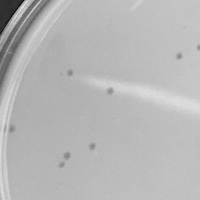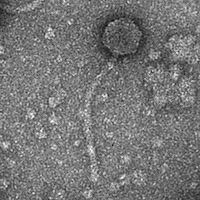Mycobacterium phage Kirpan
Know something about this phage that we don't? Modify its data.
| Detailed Information for Phage Kirpan | |
| Discovery Information | |
| Isolation Host | Mycobacterium smegmatis mc²155 |
| Found By | Novejot Singh |
| Year Found | 2017 |
| Location Found | Santa Cruz, CA USA |
| Finding Institution | University of California, Santa Cruz |
| Program | Science Education Alliance-Phage Hunters Advancing Genomics and Evolutionary Science |
| From enriched soil sample? | Yes |
| Isolation Temperature | Not entered |
| GPS Coordinates | 36.983599 N, 122.056268 W Map |
| Discovery Notes | The isolated bacteriophage, Kirpan, was characterized and found to have a large symmetrical capsid head in comparison to its long tail. At the very bottom of the tail of the phage is a spike, shown from the electron microscope images. The spike is most likely the phages mechanism to infect its host membrane. This spike positions the phage to inject its viral DNA down the tube and into the host cell. The morphology of this Kirpan can possibly affect the plaque size, depending on the mechanism of how the spike infects the bacterium. As shown in the image, the diameter of the tail is much smaller in comparison to the capsid head. Tail fibers may be present, but are not visible. There is contamination present as seen in the bottom right corner. There are also other tiny unidentified object around in the EM which may be detached spike or components of the tail. |
| Naming Notes | The name that is chosen for the isolated bacteriophage is Kirpan. In sikhism, kirpan means sword or knife, which is apart of the five articles of faith that sikhs who are baptized must wear all the time. Sikhs are supposed to represent the characteristics of a “saint soldier” who defends all people despite their race, social level, or caste. Initially, the name was to given to attest to the structure of the phage since it contains a spike which essentially is a knife for the bacterial host. However, the name was given even more conviction after comparing the other arching goal. The goal of SEA-PHAGEs is to have students help accumulate data for phage so they can be studied and depth and used to fight bacterial infections. Both the phage and the kirpan overall goals is to protect and defend, this is the ultimate reason why the name was chosen. |
| Sequencing Information | |
| Sequencing Complete? | No |
| Genome length (bp) | Unknown |
| Character of genome ends | Unknown |
| Fasta file available? | No |
| Characterization | |
| Cluster | A |
| Subcluster | A8 |
| Cluster Life Cycle | Temperate |
| Annotating Institution | Unknown or unassigned |
| Annotation Status | Not sequenced |
| Plaque Notes | The plaques, throughout all of the 5 passages, consistently showed the same small size and round shape. There were not any real difficulties per say with the various passages performed. In passage #3, (not imaged) there was a patch of yellow dots that grew in a small spiral in the middle of the plates, except the negative control. |
| Morphotype | Siphoviridae |
| Has been Phamerated? | No |
| Publication Info | |
| Uploaded to GenBank? | No |
| GenBank Accession | None yet |
| Refseq Number | None yet |
| Archiving Info | |
| Archiving status | Not in Pitt Archives |
| SEA Lysate Titer | 2.0*10^10 PFU/ml |
| Date of SEA Lysate Titering | May 5, 2017 |
| Available Files | |
| Plaque Picture | Download |
| Restriction Digest Picture | Download |
| EM Picture | Download |

